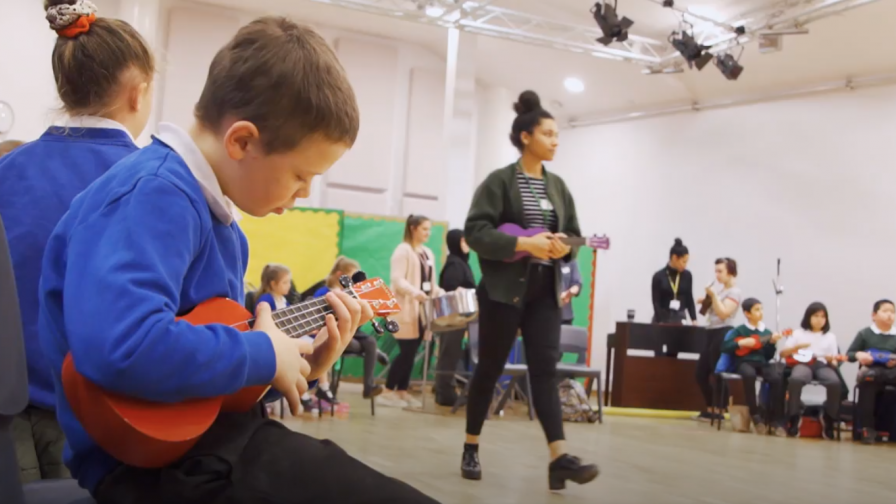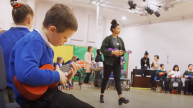How can music services help prevent school exclusion through nurture groups? Lessons from action research
In partnership with a network of school heads, Stevenage Music Centre has been piloting a programme of research into how instrumental tuition might prevent school exclusions. Michael Davidson, Head of Rock, Family and Community Music at Hertfordshire Music Service (one of the founders of the Alliance for a Musically Inclusive England through its MusicNet East/Changing Tunes programme - now called Changing Tracks) explains. This is part one of a four-part series on Music Nurture Groups for vulnerable young people - links to the three other parts are at the end of this blog.
Stevenage is a Hertfordshire new town, with several wards in the top deprived 10 per cent nationally, and an increasing number of excluded pupils. We wanted to learn more about how music could help, and in particular, the social and personal outcomes that aren’t usually documented or benchmarked in schools’ music.
We heard from staff at the PRU, who we’d worked with on a short-term inclusion project, that they were part of DSPL (Developing Special Provision Locally), one of 10 networks of Hertfordshire school head teachers, working to prevent school exclusion from primary school upwards.
We approached the Stevenage network heads (DSPL2), who agreed to match fund the programme by £11,000. They didn’t want to see improved attainment levels, but were really interested in the outcomes of confidence and resilience, and were keen to offer a creative musical activity that could improve the children’s ‘fit with school’.
We worked with the network to refine our ideas and came up with a two-pronged approach:
- Creative group music making, called ‘Nurture Groups’ which would take place at the Music Centre during the school day, or at the primary schools, for children identified as vulnerable due to mental health, behaviour or general confidence difficulties at primary school. See also How to set up an in-school Musical Nurture Group
- One-to-one music mentoring for pupils in the PRU and secondary schools, both to prevent exclusion, and to welcome them back into school.
Activities would be coordinated from Stevenage Music Centre, and match-funded from our Youth Music funding, as part of the Alliance for a Musically Inclusive England.
In the video above you’ll hear from teachers, tutors, young people and our Centre Manager about the programme and the Celebration Day we ran; and below I’ve summarised some of the key elements and findings. You can also read a blog from Ije, one of our music leaders, about the day. Ije is one of our music leaders, and previously a participant in our work.
Intended outcomes
- Musical skills and knowledge
- Resilience, confidence, agency
- Musical community
- ‘Fit with school’
Setting up the programme
- We wrote to all Stevenage schools and set up 30-minute, weekly sessions in each of the 8 primary and 4 secondary schools that responded and worked with 80 pupils aged 6-18 in these schools during our first year.
- We then contracted ‘reformed opera singer’ and trauma therapist Darren Abrahams to deliver training to music tutors based at or in schools around Stevenage Music Centre who expressed an interest in being involved in the programme.
- We also recruited two trainees, a gap year A-Level music student, and an undergraduate music student from the University of Hertfordshire.
- Through the training, we learned how school environments can limit the natural ‘resetting’ processes of the nervous system, especially for pupils with early experience of trauma. Darren also introduced tools for tutors to take care of their own wellbeing, to ‘meet’ pupils from a place of calm. We also used community music activities to reflect on how music-making could support Darren’s focus on the breath, social connection, expression and release.
‘It has changed my teaching immensely. I am continually trying new methods and communicating far more with the SEND team. Therefore enabling me to be prepared and organised for the lessons.’
First Access Violin, and nurture group tutor
- Alongside the programme in schools and the music centre, we started to run regular (bi-monthly) two-hour critical reflection sessions to help tutors adapt their practice to the different interests and needs of the young people. This has been a very important part of the programme, offering tutors an opportunity to ‘offload’ – almost peer supervision (in the social work sense of supervision), but also to share experiences, advice, and learning. We think this is a better method of musical inclusion than simply training everyone to deliver in the same way.
- The diversity of the group was key. We used WCET djembe, violin, steel pans and ukuleles tutors, alongside songwriting tutors from our Songwriter project. The more-formal tutors found it helpful to draw on the songwriter tutors’ child-centered approaches. More experienced tutors were open about where they were having challenges, and this helped establish an informal supportive atmosphere that produced lots of helpful learning. The trainees were able to draw on their own recent experience of learning music, both positive and negative.
Documenting practice and capturing impact
Some of the tutors had previously thought of case studies as something you ‘had to do for funders’. But once they were in an informal, supportive, environment, many turned out to be really good at talking about how they were adapting their practice. So we recorded these conversations and the trainees turned these into case studies to help our learning and evaluation.
We adapted our standard instrumental tuition report form to include comments from school and family, tutor and pupils on personal, social and musical progress (which we’re now using as standard across the Music Service).
We also invited the pupils to tell us, as co-researchers ‘How does learning music feel?’ and audio-recorded responses. One simple indicator of increased confidence was ‘I put my hand up more in class!’
What hindered
- Large numbers: some of the schools identified many pupils for us to work with. This meant that sometimes there weren’t enough teaching rooms available, or it was difficult to group pupils by age-group. We ran separate (additional) sessions to manage this, but have clarified expectations about this in the second year.
- Getting tutors together for training: this was tricky because of their busy teaching schedules. But those who attended all the training sessions found it benefited their confidence – and some of those who didn’t had more challenges.
What helped
- Support from school staff: the best sessions have regular support from SENCOS and TAs or trainees, and we’ve built an initial planning session into the second year of the project.
- Using composition/songwriting: tutors found this helped manage both differentiation and pupil engagement, as it gave pupils a chance to have a voice, and bring their authentic lives to schools.
- Tutors sharing their musical selves: pupils liked hearing the tutors play and sing, and getting to know them through their music.
- Working towards recordings and performances: this helped develop focus and resilience in response to challenges.
- Reflective sessions for tutors: tutors look forward to the sessions and enjoy comparing notes as co-researchers. They say that it improves their confidence and their ability to tailor their work to individual pupils needs, as well as managing inclusion better in their mainstream teaching too.
- A Head of Centre committed to inclusion: the Head of Stevenage Music Centre was already experienced in inclusion practice, and she set up the sessions with SENCOs in each school, developed links to Looked After Children, Family Intervention teams and the local children’s home. As a result several vulnerable young people have joined our Stevenage Music Centre Youth Music Leaders Council.
What were the benefits to the music service?
- Increasing the reach of the music centre: the project established a community music network around the Centre, raising its profile with schools and increasing the range of pupils attending, and their profile. For example, last April the Youth Music Council’s Give a Gig featured a track written by a pupil from the PRU.
- Engaging ‘hard to reach’ families: we ran a nurture group composition day at the Centre – featured in the video above – and we will invite programme participants and their families to attend a concert.
- Engaging ‘hard to reach’ schools: the project engaged schools we hadn’t previously worked with. School heads were very clear that they value the service as another way to for them to support vulnerable pupils. Developing the work through our mainstream tutors will help us both promote the programme to young people at risk of exclusion in all schools, as well as promote the wider service offer to those young people.
- Our inclusion work has already influenced the organisational culture of the music service. We’ve provided written guidance to the wider music service team on capturing personal and social outcomes; our lesson observation templates and critical reflection sessions we used with the trainees are being used for the wider music service quality system, and our revised staff code of conduct now advises tutors to have regular conversations with SENCOs. Most significantly, inclusion is at the centre of our new 10-year vision for the music service.
- The project offered a model for how training in and experience of inclusion practice can benefit teaching more widely. Both the tutors and the trainees commented how it had improved their ability to differentiate and to work with more challenging students in their teaching beyond the project. See ‘What skills and qualities are helpful for working with vulnerable young people?’
What next?
Next year, DSPL funding will be sustaining activities around the music centre, and Youth Music funding supporting us to develop this approach in our other music centres, one in each of the other 9 DSPL districts. To do this we’ll be diversifying recruitment, CPD and contracting to grow capacity for inclusion within our wider workforce. We’ll also be speaking with heads other music centres to draw on their local knowledge of schools which would most benefit, and to check which tutors they recommend to get involved.
We think that our nurture groups model could be replicated in other counties, and be a key part of a wider preventative inclusion strategy in schools, through partnerships with Music Services.
Further reading
- How to set up an in-school Musical Nurture Group
- Music Nurture Group Day at Stevenage Music Centre – by music leader Ije Amaechi
- What skills and qualities are helpful for working with vulnerable young people? We asked our music tutors
Hertfordshire Music Service is a founder member of the Alliance for a Musically Inclusive England (AMIE). Its MusicNet East /Changing Tunes programme helps music services to become more inclusive by providing a peer network, resources and tools, and funding for action research on the barriers and drivers to inclusion. Find out more here: www.musicnet-east.org.uk. Visit the AMIE Musical Inclusion Resource Hub for tools and guidance, blogs, videos, case studies and more, to help you break down barriers to music-making.



